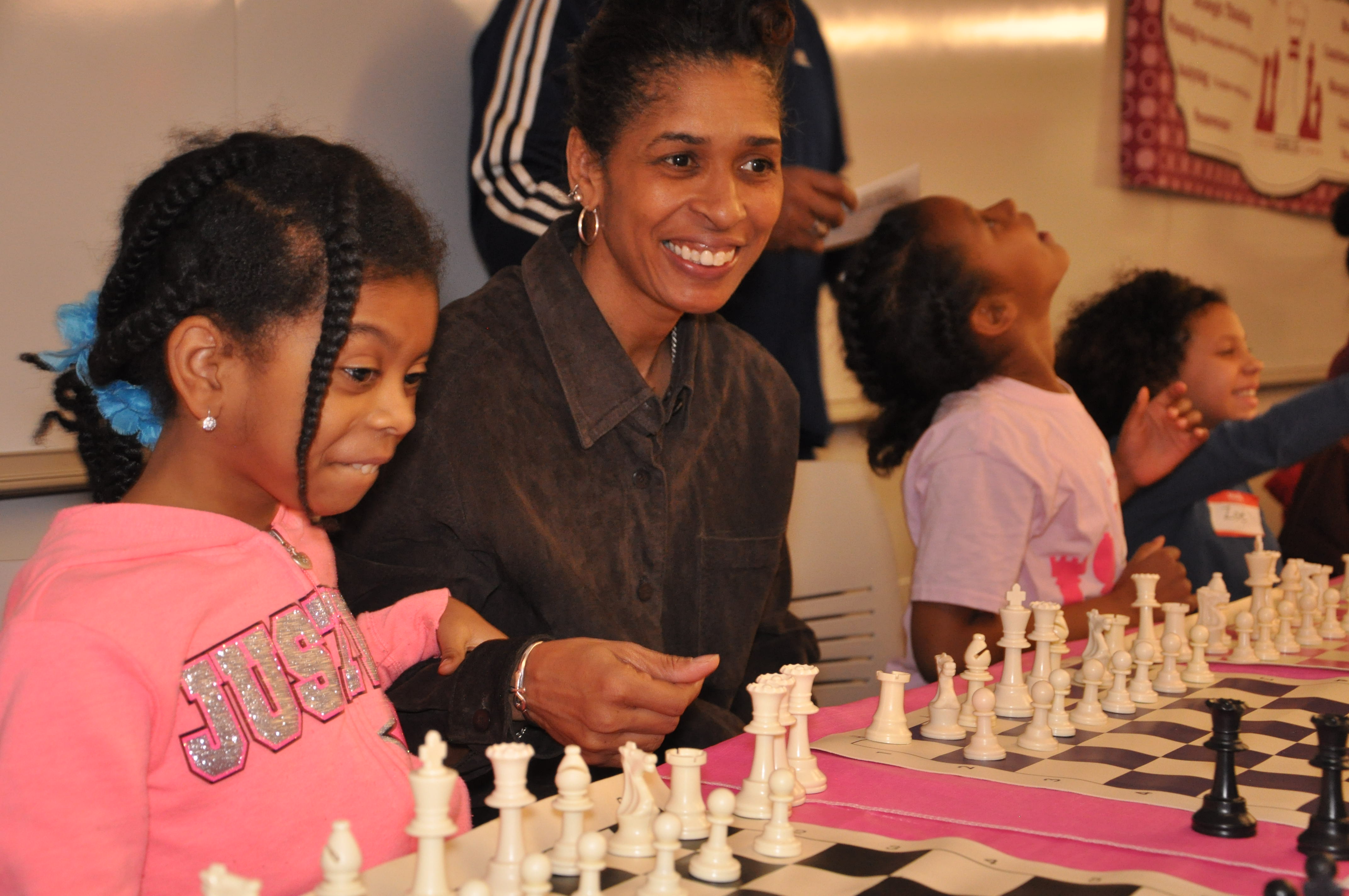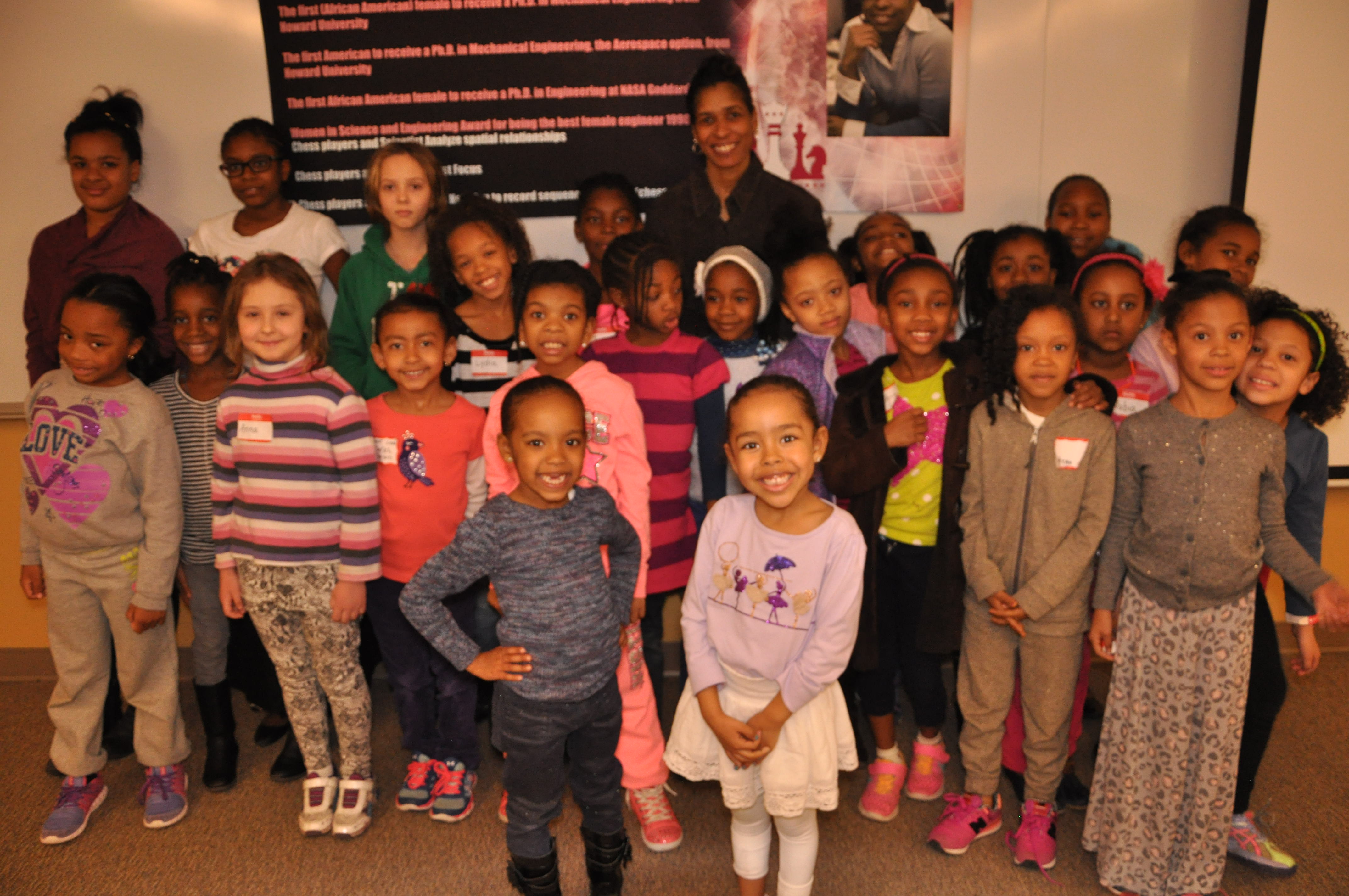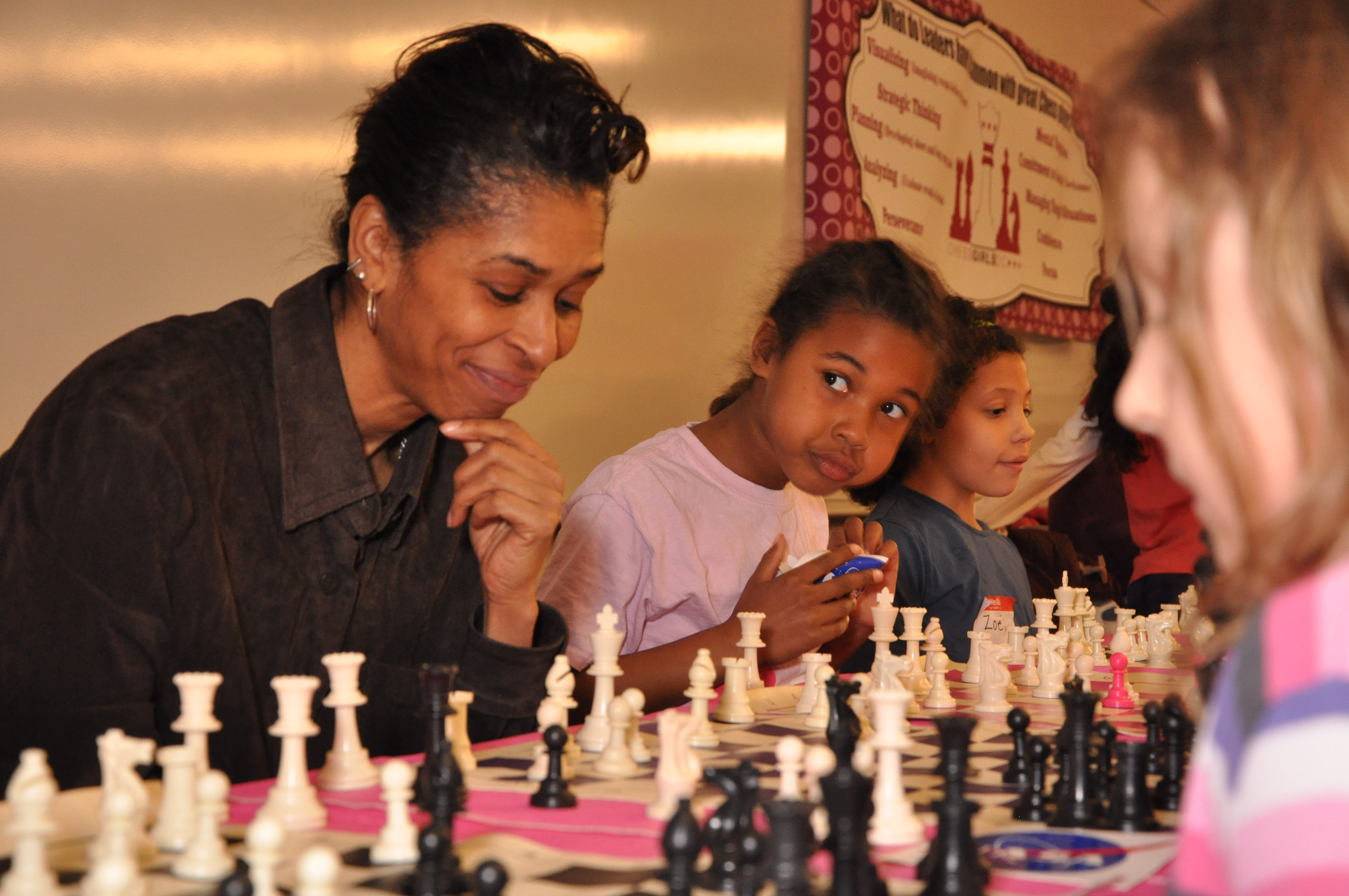On Saturday, March 5th, Dr. Aprille Ericsson of the Goddard Space Center spoke to the girls at Chess Girls DC as part of Women’s History Month. Dr. Ericsson is a graduate of MIT and the first woman to earn her Ph.D. in Mechanical Engineering from Howard University, and the first black woman to be awarded a Ph.D. in Engineering from NASA’s Goddard Space Flight Center. According to the NASA web site, “Dr. Ericsson was recognized by the National Technical Association as one of the top 50 minority women in Science and Engineering. In May of 1997, Dr.Ericsson was given the Women in Science and Engineering Award as the Best Female Engineer in the Federal Government.” After her presentation, she and her daughter sat down to play chess with the girls.
It was a fascinating talk and by the number of questions the girls asked, they were clearly very engaged. Dr. Ericsson talked about growing up in Brooklyn and how she took a special interest in math at an early age. After High School, she attended MIT where she worked on a number of “prestigious and important research projects.” She encouraged the girls to take more math classes and told them that studies show that the more math classes they COMPLETE, the higher their annual incomes will be. To drive the point home, she had everyone repeat several times, “Take more math, make more money!”
She also talked about Dr. Katherine G. Johnson, whose impressive career inspired her own. Dr. Johnson was a mathematician, physicist, and space scientist for NASA who made quite an impression on Dr. Ericsson. “Solving equations became little puzzles for her,” Dr. Ericsson told the girls. Dr. Katherine G. Johnson’s accomplishments include “calculating the flight trajectory for Alan Shepard, the first American to go into space in 1959, verifying the mathematics behind John Glenn’s orbit around the Earth in 1962, and calculating the trajectory for Project Mercury and the 1969 Apollo 11 flight to the Moon.” She retired from NASA in 1986.
 “I’m a firm believer that if you work hard, you will succeed,” Dr. Ericsson told the girls. “It is not given to me to know how many steps it will take to reach my goal,” she continued. Then she had all the girls repeat and commit to memory a message at the core of her own success, “I will persist until I succeed.”
Dr. Ericsson is currently part of a NASA team working on bringing dust back from Mars for examination. More information about Dr. Ericsson’s career is available on NASA’s web site here.
“I’m a firm believer that if you work hard, you will succeed,” Dr. Ericsson told the girls. “It is not given to me to know how many steps it will take to reach my goal,” she continued. Then she had all the girls repeat and commit to memory a message at the core of her own success, “I will persist until I succeed.”
Dr. Ericsson is currently part of a NASA team working on bringing dust back from Mars for examination. More information about Dr. Ericsson’s career is available on NASA’s web site here.
 “I’m a firm believer that if you work hard, you will succeed,” Dr. Ericsson told the girls. “It is not given to me to know how many steps it will take to reach my goal,” she continued. Then she had all the girls repeat and commit to memory a message at the core of her own success, “I will persist until I succeed.”
Dr. Ericsson is currently part of a NASA team working on bringing dust back from Mars for examination. More information about Dr. Ericsson’s career is available on NASA’s web site here.
“I’m a firm believer that if you work hard, you will succeed,” Dr. Ericsson told the girls. “It is not given to me to know how many steps it will take to reach my goal,” she continued. Then she had all the girls repeat and commit to memory a message at the core of her own success, “I will persist until I succeed.”
Dr. Ericsson is currently part of a NASA team working on bringing dust back from Mars for examination. More information about Dr. Ericsson’s career is available on NASA’s web site here.Categories
Archives
- December 2025 (27)
- November 2025 (29)
- October 2025 (39)
- September 2025 (27)
- August 2025 (29)
- July 2025 (43)
- June 2025 (25)
- May 2025 (24)
- April 2025 (29)
- March 2025 (29)
- February 2025 (20)
- January 2025 (24)
- December 2024 (34)
- November 2024 (18)
- October 2024 (35)
- September 2024 (23)
- August 2024 (27)
- July 2024 (44)
- June 2024 (27)
- May 2024 (31)
- April 2024 (51)
- March 2024 (34)
- February 2024 (25)
- January 2024 (26)
- December 2023 (29)
- November 2023 (26)
- October 2023 (37)
- September 2023 (27)
- August 2023 (37)
- July 2023 (47)
- June 2023 (33)
- May 2023 (37)
- April 2023 (45)
- March 2023 (37)
- February 2023 (28)
- January 2023 (31)
- December 2022 (23)
- November 2022 (32)
- October 2022 (31)
- September 2022 (19)
- August 2022 (39)
- July 2022 (32)
- June 2022 (35)
- May 2022 (21)
- April 2022 (31)
- March 2022 (33)
- February 2022 (21)
- January 2022 (27)
- December 2021 (36)
- November 2021 (34)
- October 2021 (25)
- September 2021 (25)
- August 2021 (41)
- July 2021 (36)
- June 2021 (29)
- May 2021 (29)
- April 2021 (31)
- March 2021 (33)
- February 2021 (28)
- January 2021 (29)
- December 2020 (38)
- November 2020 (40)
- October 2020 (41)
- September 2020 (35)
- August 2020 (38)
- July 2020 (36)
- June 2020 (46)
- May 2020 (42)
- April 2020 (37)
- March 2020 (60)
- February 2020 (38)
- January 2020 (45)
- December 2019 (34)
- November 2019 (35)
- October 2019 (42)
- September 2019 (45)
- August 2019 (56)
- July 2019 (44)
- June 2019 (35)
- May 2019 (40)
- April 2019 (48)
- March 2019 (61)
- February 2019 (39)
- January 2019 (30)
- December 2018 (29)
- November 2018 (51)
- October 2018 (45)
- September 2018 (29)
- August 2018 (49)
- July 2018 (35)
- June 2018 (31)
- May 2018 (39)
- April 2018 (31)
- March 2018 (26)
- February 2018 (33)
- January 2018 (30)
- December 2017 (26)
- November 2017 (24)
- October 2017 (30)
- September 2017 (30)
- August 2017 (31)
- July 2017 (28)
- June 2017 (32)
- May 2017 (26)
- April 2017 (37)
- March 2017 (28)
- February 2017 (30)
- January 2017 (27)
- December 2016 (29)
- November 2016 (24)
- October 2016 (32)
- September 2016 (31)
- August 2016 (27)
- July 2016 (24)
- June 2016 (26)
- May 2016 (19)
- April 2016 (30)
- March 2016 (36)
- February 2016 (28)
- January 2016 (32)
- December 2015 (26)
- November 2015 (23)
- October 2015 (16)
- September 2015 (28)
- August 2015 (28)
- July 2015 (6)
- June 2015 (1)
- May 2015 (2)
- April 2015 (1)
- February 2015 (3)
- January 2015 (1)
- December 2014 (1)
- July 2010 (1)
- October 1991 (1)
- August 1989 (1)
- January 1988 (1)
- December 1983 (1)









